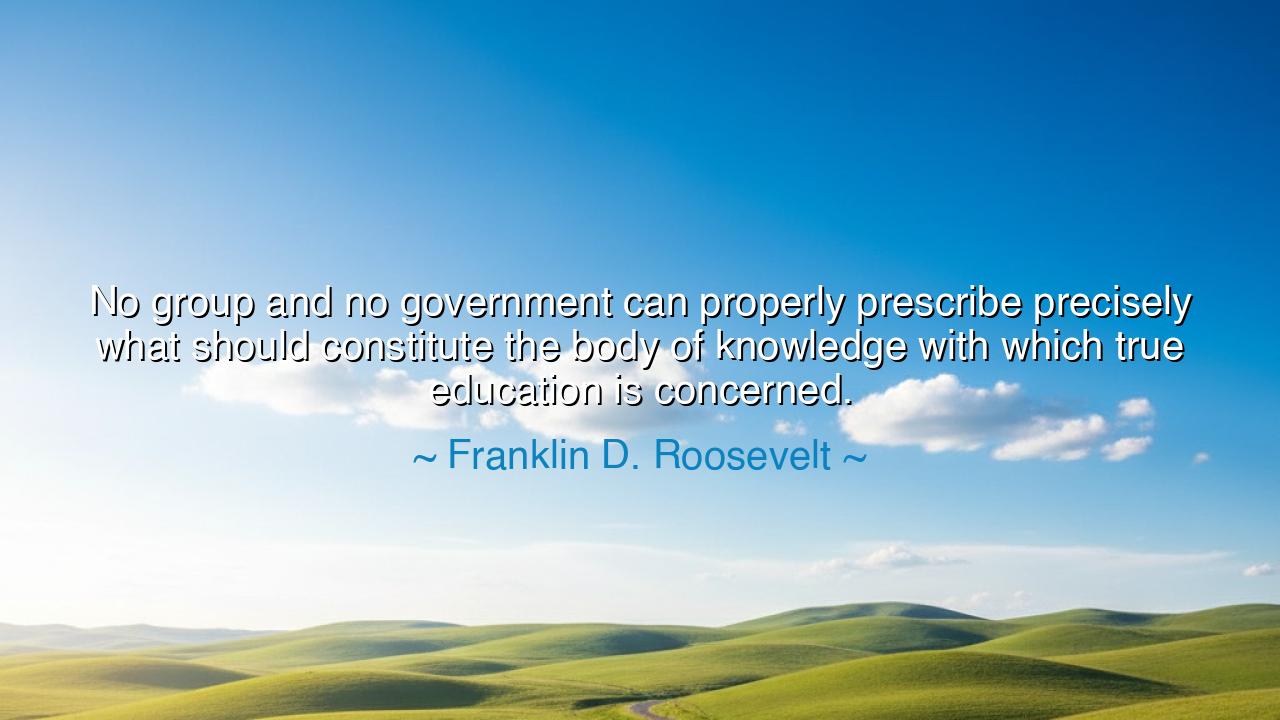
No group and no government can properly prescribe precisely what
No group and no government can properly prescribe precisely what should constitute the body of knowledge with which true education is concerned.






"No group and no government can properly prescribe precisely what should constitute the body of knowledge with which true education is concerned." — Franklin D. Roosevelt
These words, spoken by Franklin D. Roosevelt, shine like a lamp in the eternal struggle between freedom of thought and the forces that seek to bind the human mind. Here the great leader reminds us that education, in its truest form, is not a chain of doctrines nor a rigid list of facts, but a living flame — born from curiosity, nourished by wonder, and sustained by liberty. He warns us that when government or any group dares to dictate what the mind must think, what the child must learn, and what truths are permitted to be spoken, the very soul of learning begins to die.
Roosevelt lived through an age of crisis — depression, tyranny, and war. Around him, in lands not far across the sea, he saw entire nations enslaved by ideas crafted to control. In Nazi Germany, children were not taught to think, but to obey; history was rewritten to glorify the state, and science was chained to serve falsehood. Books that questioned authority were burned in great pyres, and teachers who dared to speak freely were silenced or slain. It was in the shadow of such darkness that Roosevelt raised his voice to remind the free world that true education must belong to no master but truth itself.
To prescribe knowledge, he said, is to imprison the mind. For knowledge is not a stagnant pool but a river that flows — changing, deepening, ever widening its reach. When any authority declares that learning must stop at a certain boundary, it turns that river to stone. The human mind, like the sea, rebels against walls. It was curiosity that drove Socrates to question, Galileo to peer through his telescope, and Franklin to summon lightning from the sky. Each of these men defied the accepted “body of knowledge” of their day, and for that defiance, they suffered the wrath of power. Yet through their courage, humanity itself advanced.
Look to the story of Galileo Galilei, the astronomer who dared to say that the Earth moved around the Sun. The Church of his time, mighty and unquestioned, declared his teaching heresy. They summoned him, threatened him, and forced him to recant. But though they silenced his tongue, they could not silence truth. Centuries later, his vision stood vindicated — a testament that the mind of man must be free to seek, for only through seeking can it find what is real. Roosevelt’s warning flows from this same spirit: that no government or group, however noble it believes itself to be, can hold monopoly over the light of knowledge.
For true education is not the memorizing of words, nor the repetition of dogma; it is the awakening of the mind to its own powers. It is the courage to ask questions that others fear, to imagine what does not yet exist, to test the world rather than simply believe it. A society that dictates what its citizens must know is not educating them — it is training them for obedience. A free society, on the other hand, trusts its people to explore, to argue, to discover. It understands that truth is never born from compulsion, but from dialogue, doubt, and daring.
And so, Roosevelt speaks not merely as a statesman, but as a guardian of intellectual liberty. His words carry the wisdom of all the ages: that the freedom of thought is the first defense of civilization. A nation may survive famine or war, but if it loses the right to think freely — if its schools become temples of conformity — it will sink into ignorance dressed in the robes of order. For no tyranny is greater than that which tells the young what they must believe, and no freedom more sacred than the right to pursue knowledge wherever it leads.
Lesson: Education is sacred only when it is free. The moment knowledge is dictated by authority, it ceases to be education and becomes indoctrination.
Practical Action: Defend the freedom to learn. Encourage open inquiry in your schools, your homes, your communities. Read widely — especially from those who disagree with you. Question what you are told, not from rebellion, but from love of truth. Nurture in yourself and others the courage to think. For as long as the human mind remains free to question, the light of learning can never be extinguished, and the spirit of liberty will live on through the generations.






AAdministratorAdministrator
Welcome, honored guests. Please leave a comment, we will respond soon